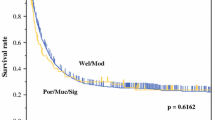Abstract
PURPOSE: Previous reports have suggested that mucinous colorectal adenocarcinomas are more advanced at diagnosis and have a poorer prognosis than nonmucinous colorectal adenocarcinomas. The purpose of this study was to clarify whether the mucin-producing histologic type of carcinoma is associated with a worse prognosis than nonmucinous, differentiated colorectal adenocarcinoma for patients who undergo curative surgery. METHODS: Using a database of 2,678 surgical patients with colorectal cancers operated on at Aichi Cancer Center between 1965 and 1994, we investigated 97 cases of mucinous adenocarcinoma and 2,197 cases of nonmucinous adenocarcinoma. We also evaluated the outcomes of patients who underwent surgery with curative intent. To determine whether the mucinous adenocarcinoma itself was an independent prognostic factor in the curative resected patients, a multivariate analysis was performed. RESULTS: The mucinous adenocarcinoma patients were found to be younger (P = 0.0003), have more lymph node involvement (48.5 vs. 40.3 percent; P = 0.0564), more peritoneal dissemination (19.6 vs. 5.6 percent; P < 0.0001), greater frequency of advanced stage disease (P = 0.0006), a lower rate of curative resection (76.3 vs. 84.4 percent; P = 0.0450), and lower overall 5-year survival rates (41 vs. 62.4 percent; P = 0.0002) than nonmucinous adenocarcinoma patients. In the subjects who underwent curative resection, the 5-year survival rate for those with mucinous adenocarcinoma was significantly worse than for those with nonmucinous adenocarcinoma (54 vs. 73.3 percent; P = 0.0020). Multivariate analysis using the Cox proportional hazards model showed that the clinically significant predictive factors were stage at diagnosis, mucinous histology, tumor location, gender and age. The mucinous histologic type itself was an independent factor for poor prognosis for patients who underwent curative surgery. CONCLUSIONS: In patients with colorectal carcinomas who underwent surgery with curative intent and who had colorectal carcinomas of the mucinous histologic type, there was significant correlation with prognosis as measured by overall survival rate after adjustment had been made for major confounders.
Similar content being viewed by others
References
B Levin (1999) ArticleTitleRisk of cancer in ulcerative colitis Gastrointest Endosc 49 60–62
HT Lynch TC Smyrk P Watson et al. (1993) ArticleTitleGenetics, natural history, tumor spectrum, and pathology of hereditary nonpolyposis colorectal cancer Gastroenterology 104 1535–1549
HC Umpleby DL Ranson RC Williamson (1985) ArticleTitlePeculiarities of mucinous colorectal carcinoma Br J Surg 72 715–718
DA Symonds AL Vickery (1976) ArticleTitleMucinous carcinoma of the colon and rectum Cancer 37 1891–1900
JB Green AE Timmcke WT Mitchell TC Hicks JB Gathright SuffixJr JE Ray (1993) ArticleTitleMucinous carcinoma–just another colon cancer? Dis Colon Rectum 36 49–54
GB Secco R Fardelli E Campora et al. (1994) ArticleTitlePrimary mucinous adenocarcinomas and signet-ring cell carcinomas of colon and rectum Oncology 51 30–34
K Isono T Saitoh H Sato et al. (1975) ArticleTitleHistopathological on the prognosis of rectal carcinoma, especially on the comparison with that of the gastric carcinoma Gan No Rinsho 21 905–909
BD Minsky C Mies TA Rich A Recht JT Chaffey (1987) ArticleTitleColloid carcinoma of the colon and rectum Cancer 60 3103–3112
E Pihl RC Nairn ES Hughes AM Cuthbertson AJ Rollo (1980) ArticleTitleMucinous colorectal carcinoma Pathology 12 439–447
TB Halvorsen E Seim (1988) ArticleTitleInfluence of mucinous components on survival in colorectal adenocarcinomas J Clin Pathol 41 1068–1072
CS Wu SY Tung PC Chen YC Kuo (1996) ArticleTitleClinicopathological study of colorectal mucinous carcinoma in Taiwan J Gastroenterol Hepatol 11 77–81
JH Connelly SS Robey-Cafferty KR Cleary (1991) ArticleTitleMucinous carcinomas of the colon and rectum. An analysis of 62 stage B and C lesions Arch Pathol Lab Med 115 1022–1025
C Compton CM Fenoglio-Preiser N Pettigrew LP Fielding (2000) ArticleTitleAmerican Joint Committee on Cancer Prognostic Factors Consensus Conference Cancer 88 1739–1757
E Kaplan P Meier (1958) ArticleTitleNonparametric estimation from incomplete observations J Am Stat Assoc 53 457–481
M Okuno T Ikehara M Nagayama Y Kato S Yui K Umeyama (1988) ArticleTitleMucinous colorectal carcinoma Am Surg 54 681–685
O Sasaki WS Atkin JR Jass (1987) ArticleTitleMucinous carcinoma of the rectum Histopathology 11 259–272
F Consorti A Lorenzotti G Midiri M Di Paola (2000) ArticleTitlePrognostic significance of mucinous carcinoma of colon and rectum J Surg Oncol 73 70–74
G Lanza SuffixJr I Maestri A Dubini et al. (1996) ArticleTitlep53 expression in colorectal cancer Am J Clin Pathol 105 604–612
S Backert M Gelos U Kobalz et al. (1999) ArticleTitleDifferential gene expression in colon carcinoma cells and tissues detected with a cDNA array Int J Cancer 82 868–874
L Messerini F Vitelli LR De Vitis et al. (1997) ArticleTitleMicrosatellite instability in sporadic mucinous colorectal carcinomas J Pathol 182 380–384
R Gryfe H Kim ET Hsieh et al. (2000) ArticleTitleTumor microsatellite instability and clinical outcome in young patients with colorectal cancer N Engl J Med 342 69–77
P Watson KM Lin MA Rodriguez-Bigas et al. (1998) ArticleTitleColorectal carcinoma survival among hereditary nonpolyposis colorectal carcinoma family members Cancer 83 259–266
Author information
Authors and Affiliations
About this article
Cite this article
Kanemitsu, Y., Kato, T., Hirai, T. et al. Survival After Curative Resection for Mucinous Adenocarcinoma of the Colorectum. Dis Colon Rectum 46, 160–167 (2003). https://doi.org/10.1007/s10350-004-6518-0
Issue Date:
DOI: https://doi.org/10.1007/s10350-004-6518-0




